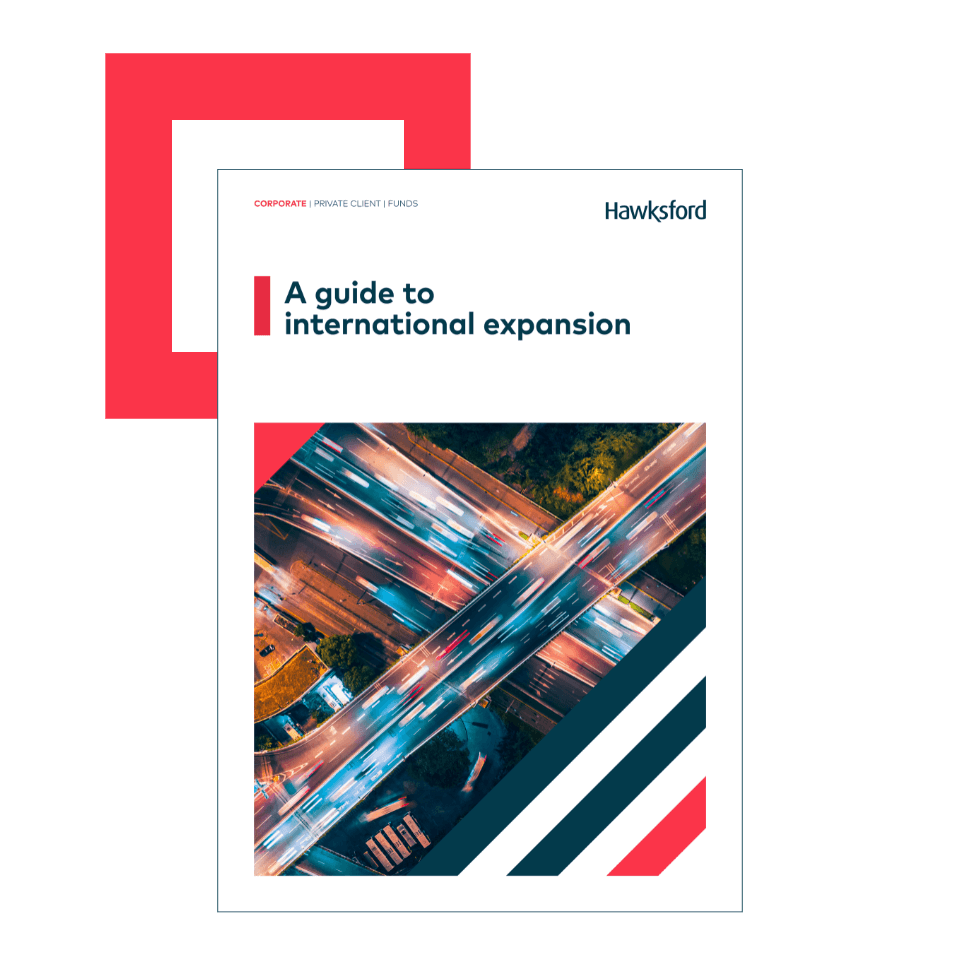Asian market entry:
are you asking the right questions?
01 January 2019 | Guide
Expanding into unknown markets can be time-consuming, risky, and complex. Hawksford provides efficient end-to-end corporate, accounting, business expansion, and operational compliance solutions, that enables some of the world's most distinguished and commercially trading businesses to grow and expand into new markets.
International business expansion - Asian market entry
Our experts suggest every business should consider these top questions before market entry into Asia.
- What does my business need?
- Who are my customers, and where are they?
- What legal regime suits my business?
- Thinking about the future
- Answering the questions
One of the most attractive reasons for any business to enter the Asian market is how quickly a business can establish a presence and focus on growth.
However, it is also a region where the consequences of choosing the wrong base of operations can become a significant burden in the long term.
This makes it critical that businesses take the time to ask themselves the right questions before settling on a future home in Asia.
What does my business need to expand into Asia?
Often, we encounter businesses which have set out with a specific target market for expansion, for example, Vietnam. Sometimes this is based on a local connection, but just as often based on out-dated or partial information about realities on the ground.
It’s also often a sign that the business may have skipped the most critical step in planning their expansion - a look in the mirror. The first question is not what your business is bringing to Asia, but what your business will rely upon to thrive there.
What is the central activity of your business? If you are a manufacturer, some regions which recently were globally renowned for their manufacturing zeal have now moved on.
China was historically a strong destination for western industrial delocalisation for Europe, but today it has evolved into a consumer market, where the logistical costs far outweigh its neighbours, where supply chains have shifted.
For hi-tech businesses, by contrast, a wide range of locations have opened up, competing to attract next-generation skills and technology. If your business would thrive through incentives and support for research and development, it's worth considering which incentives are most critical to your success.
The governments for Singapore and Hong Kong, for example, are actively developing hubs for high-tech skills and development of new products.
Hong Kong is indeed a leader in supporting innovative companies with multiple initiatives and financial support.
Nicholas Yang, Secretary for Innovation and Technology says:
“To encourage more private venture capital funds to invest in Hong Kong start-ups, we have established a HK$2 billion Innovation and Technology Venture Fund to co-invest with the private VCs. In addition, another HK$7 billion was provided to the Hong Kong Science Park to enhance support for its tenants and incubates. Up to 300 per cent super tax deduction on R&D expenses, without upper limit, is now available to all Hong Kong companies. All in all, the Hong Kong SAR Government has already invested over HK$100 billion in innovation and technology development during the past three years. There is more to come. Hong Kong's innovation and technology ecosystem is more robust than it ever has been.”
Who are my customers, and where are they?
Once a business has a clear sense of what it needs, the next set of questions are about where you will be selling, and to whom.
Asia is home to some of the largest and fastest growing consumer markets in the world, and nowhere is that truer than in China. For many businesses, China represents such a vast market that it can stand alone as the focus for a business’ medium-term growth.
However, as a continent-sized market, reaching your customers quickly and efficiently is important. For executives that must travel regularly to multiple Chinese cities in the North of the country, a base in Shanghai would reduce the need for border crossings and could help ensure faster routes to your market.
For others, their business’ core customers lie in the sophisticated and interconnected supply network of trade between nations in the region. As our recent Business Outlook has shown, Singapore has cemented its position as the best connected hub for access to countries across South-East Asia.
With an airport 20 minutes from the center of town, it also has huge appeal for businesses which need to send staff travelling to multiple markets. Efficient travel enables large-scale international strategies without excessive time lost.
What legal regime suits my business?
Having considered markets and geography, it becomes crucial to review the legal framework of the markets you wish to enter, and determine which are the best fit, or least burdensome to your work.
As understanding the legal framework requires time, care and attention, we recommend businesses start this work once they have narrowed their scope to key few markets. However, it is, without a doubt, this is the single most important factor for growth.
Understanding the impact of the local legal framework can be a definitive factor for many businesses.
The Indonesian government, for example, limits the percentage of allowable foreign ownership for several sectors, including agriculture, oil & gas, and retail, the limits to which are published in a ‘Negative Investment List’ (DNI), which is revised roughly on a 3 year cycle.
A thorough understanding of current limits, and expectations for the future, is vital for executing any medium-term plan.
Thinking about the future
If a company has carefully considered the questions above, they are well on their way to landing their business in a favourable and well-suited market for their strategy.
The final set of questions are therefore about the prospects for the region's future, and what indications there are that it will be a good home both today and tomorrow.
Singapore, for example, is tireless in its efforts to maintain strong, effective trade agreements with its neighbours. It holds the largest number of double taxation agreements in the world and has been a dedicated advocate for some of the largest global trade agreements.
The EU-Singapore Free Trade agreement was signed last year, as was the Comprehensive and Progressive Agreement for Trans-Pacific Partnership. Singapore is still today leading efforts to widen the APAC trade ecosystem, drawing in the largest global economies.
If your business thrives on international trade today and in the future, Singapore has a proven track record for trade.
For businesses interested in Hong Kong, understanding the future set out by the Greater Bay Area (GBA) initiative is essential to long term planning for success in the region. The GBA is an effort to align 11 cities of the Pearl River Delta, creating one of the world’s largest coordinated and cooperative regions of specialised hubs in the world.
For businesses which wish to expand their operations to draw on this expanding ecosystem, Hong Kong is evolving to present new advantages for ambitious businesses.
Global business expansion: Answering the questions
For many international firms, a regional Asian strategyis critical to their growth and prospects in the long term.
While awareness of the opportunities presented by Asia is everywhere, there persists a significant knowledge gap about on-the-ground conditions, evolving supply-chain relationships and political change.
We encourage businesses of all sizes and industries to avoid guesswork, and make sure they get help and answers to those questions that spell the difference between fast success or long-term frustration.
Hawksford is an established facilitator of market entry and business expansion into Asia-Pacific.
Our experts enable you to enter, establish and structure your business in new and diverse markets, through our alliance of vetted partner firms.
Whether you are testing a market, or expanding at a rapid pace through joint ventures, investment projects or M&A, we help you manage the risks and complexities of business expansion.
Asia market development solutions:
- Expansion advisory
- Corporate structuring
- Accounting and tax
- Business immigration and mobility
- International payroll
- Corporate governance and compliance

Contact our International business expansion experts
Choose your preferred contact method and one of our dedicated experts will be in touch

A guide to international expansion
This guide details the major benefits of international expansion, the challenges involved and how we can help you meet them as you grow your business.
Disclaimer: this article is intended for general information only and is not intended to apply to any specific situations or to constitute legal advice.